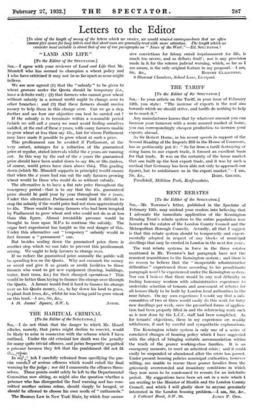THE HABITUAL- CRIMINAL
[To the Editor of the SPECTATOR.] Sea,—I do not' think that the danger to which Mr. Heard alludes, namely; that juries might decline to convict, would be likely to arise in connexion with the scheme which I have outlined. Under the old criminal law death was the penalty for many quite trivial offences, and juries frequently acquitted- a prisoner because they felt that the punishment did not fit In m' e' itch I carefully refrained from specifying the pre- cise numb,. ' of serious offences which would entail the final warning by the judge ; nor did' I enumerate the offences them- selves. Those points could safely be left to the Departmental Committee now sitting, as might also the question whether a prisoner who has disregarded' the final warning and has com- mitted another serious crime, should simply be hanged, or should be allowed to choose his' own' mode. of " euthanasia."
The Baumes Law in New York State, bY which four succes-
sive convictions for felony entail imprisonment for life,. is much too severe, and so defeats itself ; nor is any provision made in it for the solemn judicial warning, which, so far as I am aware, is the only original feature in my proposal.--I am,


































 Previous page
Previous page